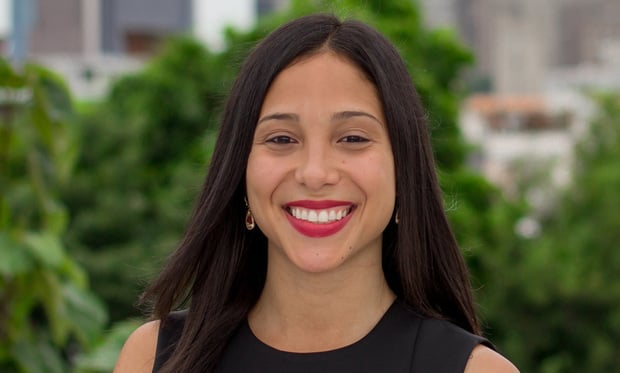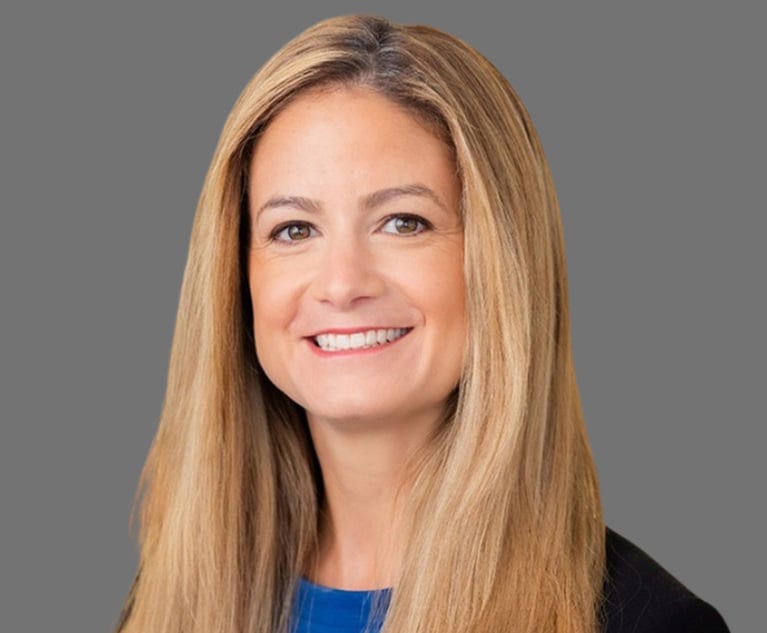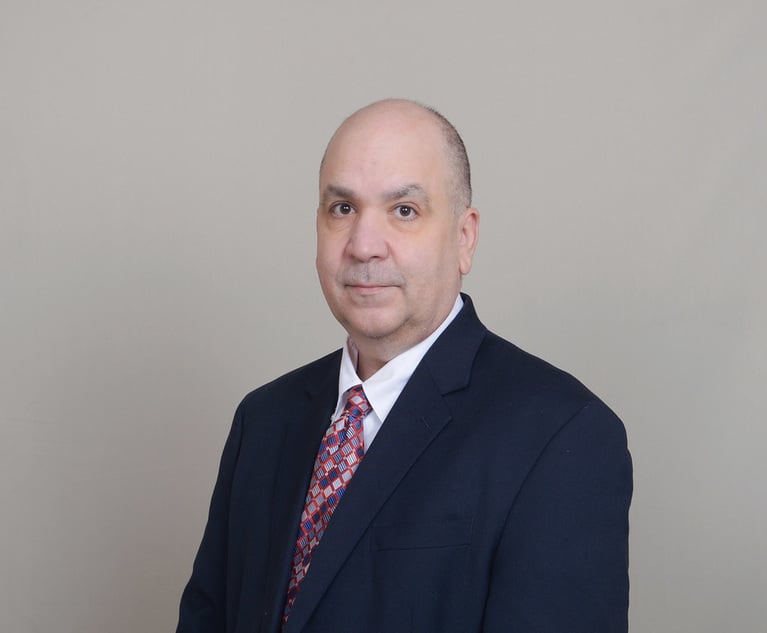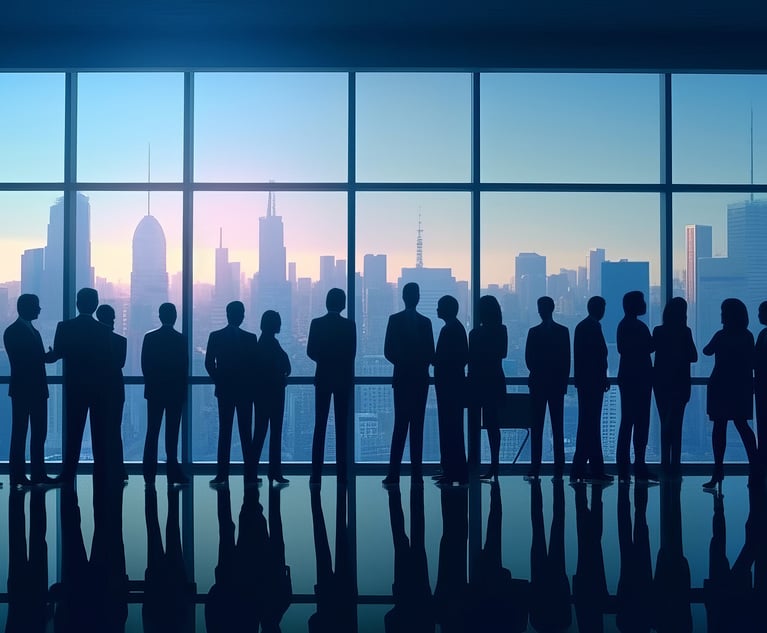Phila. Law Department's New Professional Development Director Seeks to Diversify Office
Before joining the Law Department, Iveliz Crespo, the city of Philadelphia Law Department's newest director of professional development, worked as a civil attorney for several nonprofit organizations representing minority communities.
May 21, 2019 at 02:32 PM
5 minute read
 Iveliz Crespo, director of professional development with the Law Department of the city of Philadelphia.
Iveliz Crespo, director of professional development with the Law Department of the city of Philadelphia.
Iveliz Crespo, the city of Philadelphia Law Department's newest director of professional development, is on a mission to diversify the ranks of city attorneys.
Before joining the Law Department, Crespo worked as a civil attorney for several nonprofit organizations representing minority communities. She has represented migrant farm workers in civil rights, labor trafficking, and employment cases and LGBTQ clients in a variety of legal matters related to sexual orientation and gender identity.
Hired by City Solicitor Marcel Pratt to her new post in September, The Legal asked her about the current state of the Law Department and her vision for the future:
Q: Is the Philadelphia Law Department currently a reflection of the community it serves? If not, why?
A: Ensuring diversity in the workforce of the Philadelphia Law Department continues to be a key priority on my agenda. The Law Department should reflect the diversity of all of Philadelphia's citizens.
As attorneys, we have a shared responsibility to provide historically underrepresented groups the opportunity to participate fully in our profession. I believe this is both a moral and ethical responsibility—one that is rooted in a belief that law, at its best, can be a means of achieving equality for all.
This obligation is even more significant in the public sector, where we ultimately are accountable to the public as well as our government clients.
At the Law Department, I am proud that out of a staff of 332 employees, nearly 43% identify as racially diverse and about 63% identify as women.
Despite these numbers, we still have many strides to make to ensure that we are fully reflective of the community that we serve. I am proud to work with an executive team that is equally committed to attaining that goal
Q: How do you measure an office's diversity?
A: As a queer woman of color, my view of diversity is a global and intersectional one that includes, but is not limited to, race, gender, sexual orientation, gender identity, disability, age, pregnancy, religion and veteran status. At some point, everyone falls into an identity that may come up against a barrier to their full participation.
That's why it is important to have a wide lens on diversity and an understanding that the concept of diversity is a fluid one that must be continuously adjusted to adapt to the ever-changing nature of our population.
To ensure that we are ahead of the curve, we are conducting an inclusivity assessment, that will allow us the opportunity to measure diversity beyond race and sex, and to ensure that we are providing an inclusive work environment where everyone can thrive.
Q: How will you attract diverse attorneys to the ranks of the law department?
A: We are committed to ensuring that we are consistent in our efforts to attract and retain diverse talent.
The Law Department remains committed to diversity through our hiring process by both ensuring that diverse candidates are part of the pool of potential candidates and ensuring that hiring panels are diverse.
Law's increased diversity reflects our efforts to recruit diverse attorneys from law schools, law firms and other areas. In addition, the Law Department encourages attorneys to pursue leadership positions in legal organizations and minority-based affinity groups, which directly assists in raising the profile of the Law Department and attracting talented individuals.
In fact, since January 2019, 66% of our new hires identified as people of color and 61% identified as women.
As the first-ever director of professional development/diversity and inclusion, one of my focuses has been to continue expanding outreach efforts with law schools and minority-based affinity groups to fill vacant positions.
Additionally, I recognize that diversity initiatives are unsuccessful unless we are intentional about creating an inclusive work environment. In conjunction with our first-ever inclusivity assessment, we are also ensuring that our professional development trainings include ongoing cultural competency workshops.
Q: What challenges to your goal keep you up at night?
A: The biggest challenge about working in my role is that the work is never “done.” There will always be more to do when it comes to creating a more diverse and inclusive workplace and world.
This content has been archived. It is available through our partners, LexisNexis® and Bloomberg Law.
To view this content, please continue to their sites.
Not a Lexis Subscriber?
Subscribe Now
Not a Bloomberg Law Subscriber?
Subscribe Now
NOT FOR REPRINT
© 2025 ALM Global, LLC, All Rights Reserved. Request academic re-use from www.copyright.com. All other uses, submit a request to [email protected]. For more information visit Asset & Logo Licensing.
You Might Like
View All

JCPenney Customer's Slip-and-Fall From Bodily Substance Suit Best Left for a Jury to Decide, Judge Rules
4 minute read
People in the News—Jan. 9, 2025—Rawle & Henderson, Armstrong Teasdale
3 minute read
Trending Stories
- 1'It's Not Going to Be Pretty': PayPal, Capital One Face Novel Class Actions Over 'Poaching' Commissions Owed Influencers
- 211th Circuit Rejects Trump's Emergency Request as DOJ Prepares to Release Special Counsel's Final Report
- 3Supreme Court Takes Up Challenge to ACA Task Force
- 4'Tragedy of Unspeakable Proportions:' Could Edison, DWP, Face Lawsuits Over LA Wildfires?
- 5Meta Pulls Plug on DEI Programs
Who Got The Work
Michael G. Bongiorno, Andrew Scott Dulberg and Elizabeth E. Driscoll from Wilmer Cutler Pickering Hale and Dorr have stepped in to represent Symbotic Inc., an A.I.-enabled technology platform that focuses on increasing supply chain efficiency, and other defendants in a pending shareholder derivative lawsuit. The case, filed Oct. 2 in Massachusetts District Court by the Brown Law Firm on behalf of Stephen Austen, accuses certain officers and directors of misleading investors in regard to Symbotic's potential for margin growth by failing to disclose that the company was not equipped to timely deploy its systems or manage expenses through project delays. The case, assigned to U.S. District Judge Nathaniel M. Gorton, is 1:24-cv-12522, Austen v. Cohen et al.
Who Got The Work
Edmund Polubinski and Marie Killmond of Davis Polk & Wardwell have entered appearances for data platform software development company MongoDB and other defendants in a pending shareholder derivative lawsuit. The action, filed Oct. 7 in New York Southern District Court by the Brown Law Firm, accuses the company's directors and/or officers of falsely expressing confidence in the company’s restructuring of its sales incentive plan and downplaying the severity of decreases in its upfront commitments. The case is 1:24-cv-07594, Roy v. Ittycheria et al.
Who Got The Work
Amy O. Bruchs and Kurt F. Ellison of Michael Best & Friedrich have entered appearances for Epic Systems Corp. in a pending employment discrimination lawsuit. The suit was filed Sept. 7 in Wisconsin Western District Court by Levine Eisberner LLC and Siri & Glimstad on behalf of a project manager who claims that he was wrongfully terminated after applying for a religious exemption to the defendant's COVID-19 vaccine mandate. The case, assigned to U.S. Magistrate Judge Anita Marie Boor, is 3:24-cv-00630, Secker, Nathan v. Epic Systems Corporation.
Who Got The Work
David X. Sullivan, Thomas J. Finn and Gregory A. Hall from McCarter & English have entered appearances for Sunrun Installation Services in a pending civil rights lawsuit. The complaint was filed Sept. 4 in Connecticut District Court by attorney Robert M. Berke on behalf of former employee George Edward Steins, who was arrested and charged with employing an unregistered home improvement salesperson. The complaint alleges that had Sunrun informed the Connecticut Department of Consumer Protection that the plaintiff's employment had ended in 2017 and that he no longer held Sunrun's home improvement contractor license, he would not have been hit with charges, which were dismissed in May 2024. The case, assigned to U.S. District Judge Jeffrey A. Meyer, is 3:24-cv-01423, Steins v. Sunrun, Inc. et al.
Who Got The Work
Greenberg Traurig shareholder Joshua L. Raskin has entered an appearance for boohoo.com UK Ltd. in a pending patent infringement lawsuit. The suit, filed Sept. 3 in Texas Eastern District Court by Rozier Hardt McDonough on behalf of Alto Dynamics, asserts five patents related to an online shopping platform. The case, assigned to U.S. District Judge Rodney Gilstrap, is 2:24-cv-00719, Alto Dynamics, LLC v. boohoo.com UK Limited.
Featured Firms
Law Offices of Gary Martin Hays & Associates, P.C.
(470) 294-1674
Law Offices of Mark E. Salomone
(857) 444-6468
Smith & Hassler
(713) 739-1250





